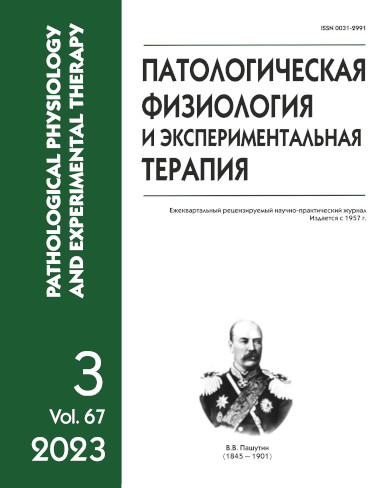Effects of glutamate antibodies and F(ab´)₂ fragments of glutamate antibodies on the anxiety level in aging C57Bl/6 mice
Abstract
Introduction. Anxiety disorder occurs in approximately 15-25% of the adult population. A high degree of anxious personality disorders was found in 96% of old people and in 100% of very old people, whereas 50% of old people and 56% of people older than 75 had increased reactive anxiety. In persistent anxiety, production of β-amyloid increases and contributes to the development of neurodegenerative diseases of old age. Despite the availability of a large arsenal of pharmacological agents for the treatment of anxiety disorders, development of drugs based on antibodies and their fragments is promising due to their specificity, activity, and metabolic activity. Previous experiments on BALB/C mice showed a decrease in the anxiety level after a single intraperitoneal injection of glutamate antibodies. Experiments on aging mice and experimental models of Alzheimer’s disease demonstrated an anti-amnesic effect of affinity-purified polyclonal glutamate antibodies administered intranasally. The aim of the study was to evaluate the effect of intranasal glutamate antibodies and F(ab´)2 fragments of glutamate antibodies on the level of anxiety in aging C57Bl/6 mice. Methods. The study was performed on 12-month-old C57Bl/6 mice. Mice were divided into three groups: two experimental groups received polyclonal monospecific antibodies to glutamate (AT- GLU) and F(ab´)2 fragments of AT- GLU. The agents were dissolved in saline and administered intranasally at a dose of 250 µg/kg in a volume of 4 µl, daily for 3 days. Mice of the control group received intranasal saline in the same volume. The behavioral activity of mice was assessed by the open field test and the level of anxiety by the elevated plus maze test. Results. Intranasal administration of AT- GLU and F(ab´)2 fragments of AT-GLU to aging mice resulted in a significant increase in the number of visits to and the time spent in the center of the open field, a decrease in the time spent in the corners, and an increase in the number of rears in the corners of the open field compared to the control group. The elevated plus maze test showed that mice treated with AT- GLU and F(ab´)2 fragments of AT- GLU significantly increased the time spent in the open arms of the maze, as well as the number of unprotected head dips compared to the control group, which indicated a decrease in anxiety and fear. Conclusion. The study results indicated a possible decrease in the level of anxiety and fear in aging C57Bl/6 mice treated with glutamate antibodies and F(ab´)2 fragments of glutamate antibodies, which suggested an anxiolytic effect of glutamate antibodies and their F(ab´)2 fragments.






